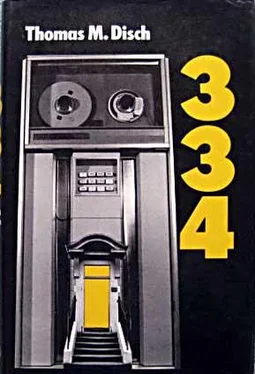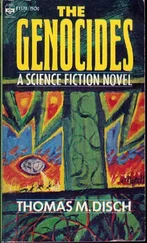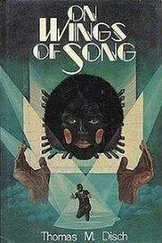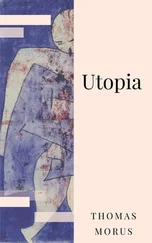It was done as neatly as that. The two people whose curiosity or impatience might still have spoiled the substitution were now clamped to each other like a pair of steel traps, jaw to jaw to jaw to jaw.
He hadn’t considered the elevator situation. During his own shift there were seldom logjams. When there were, carts routed for the morgue were last in line. At 6:15, when the Schaap was finally signed over to him, every elevator arriving on 18 was full of people who’d ridden to the top in order to get a ride to the bottom. It might be an hour before Ab and his cart could find space and the Macy’s driver would certainly not sit still that much longer.
He waited till the hallway was empty, then scooped up the body from the cart. It weighed no more than his own Beno, but even so by the time he’d reached the landing of 12, he was breathing heavy. Halfway down from 5 his knees gave out. (They’d given fair warning but he’d refused to believe he could have gone so soft.) He collapsed with the body still cradled in his arms.
He was helped to his feet by a blond young man in a striped bathrobe many sizes too small. Once Ab was sitting up. the young man tried to assist Frances Schaap to her feet. Ab, gathering his wits, explained that it was just a body. “Hoo-wee, for a minute there, I thought…” He laughed uncertainly at what he’d thought.
Ab felt the body here and there and moved its limbs this way and that, trying to estimate what damage had been done. Without undressing it, this was difficult.
“How about you?” the young man asked, retrieving the cigarette he’d left smoking on a lower step.
“I’m fine.” He rearranged the sheet, lifted the body and started off again. On the third-floor landing he remembered to shout up a thank-you at the young man who’d helped him.
Later, during visiting hours in the ward, Ray said to his friend Charlie, who’d brought in new cassettes from the shop where he worked: “It’s incredible some of the things you see in this hospital.”
“Such as?”
“Well, if I told you you wouldn’t believe.” Then he spoiled his whole build-up by twisting round sideways in bed. He’d forgotten he couldn’t do that.
“How are you feeling?” Charlie asked, after Ray had stopped groaning and making a display. “I mean, in general.”
“Better, the doctors say, but I still can’t piss by myself.” He described the operation of the catheter, and his self-pity made him forget Ab Holt, but later, alone and unable to sleep (for the man in the next bed made bubbling sounds) he couldn’t stop thinking of the dead girl, of how he’d picked her up off the steps, her ruined face and frail, limp hands, and how the fat attendant from the morgue had tested, one by one, her arms and legs, to see what he’d broken.
There was nothing for her in the morgue, Joel had decided, now that the day had yielded its one obit to nullify the nonevent. She phoned back to the desk but neither Darling nor the computer had any suggestions.
She wondered how long it would be before they fired her. Perhaps they thought she would become so demoralized if they kept her on stand-by that she’d leave without a confrontation scene.
Human interest: surely somewhere among the tiers of this labyrinth there was a story for her to bear witness to. Yet wherever she looked she came up against flat, intractable surfaces: Six identical wheelchairs all in a row. A doctor’s name penciled on a door. The shoddiness, the smells. At the better sort of hospitals, where her family would have gone, the raw fact of human frangibility was prettied over with a veneer of cash. Whenever she was confronted, like this, with the undisguised bleeding thing, her first impulse was to avert her eyes, never—like a true journalist—to bend a little closer and even stick a finger in it. Really, they had every reason to give her the sack.
Along one stretch of the labyrinth iron curlicues projected from the walls at intervals. Gas brackets? Yes, for their tips, obscured by layer upon layer of white paint, were nozzle-shaped. They must have dated back to the nineteenth century. She felt the slightest mental tingle.
But no, this was too slim a thread to hang a story from. It was the sort of precious detail one notices when one’s eyes are averted.
She came to a door with the stenciled letters: “Volunteers.” As this had a rather hopeful ring to it, human-interest-wise, she knocked. There was no answer and the door was unlocked. She entered a small unhappy room whose only furniture was a metal filing cabinet. In it was a rag-tag of yellowing mimeographed forms and equipment for making Koffee.
She pulled the cord of the blinds. The dusty louvres opened unwillingly. A dozen yards away cars sped past on the upper level of the East Side Highway. Immediately the whooshing noise of their passage detached itself from the indiscriminate, perpetual humming in her ears. Below the highway a slice of oily river darkened with the darkening of the spring sky, and below this a second stream of traffic moved south.
She got the blinds up and tried the window. It opened smoothly. A breeze touched the ends of the scarf knotted into her braids as she leaned forward.
There, not twenty feet below, was her story, the absolutely right thing: in a triangle formed by a feeder ramp to the highway and the building she was in and a newer building in the bony style of the ’70’s was the loveliest vacant lot she’d ever seen, a perfect little garden of knee-high weeds. It was a symbol: of Life struggling up out of the wasteland of the modern world, of Hope…
No, that was too easy. But some meaning, a whisper, did gleam up to her from this patch of weeds (she wondered what their names were; at the library there would probably be a book …), as sometimes in Tender Buttons the odd pairing of two ordinary words would generate similar flickerings poised at the very threshold of the intelligible. Like:
An elegant use of foliage and grace and a little piece of white cloth and oil.
Or, more forcibly: A blind agitation is manly and uttermost.
The usual cirrus at the horizon of pain had thickened to a thunder-head. Sleepless inside a broken unit in the annex to Emergency, he stared at the red bulb above the door, trying to think the pain away. It persisted and grew, not only in his shoulder but in his fingers sometimes, or his knees, less a pain than an awareness that pain were possible, a far-off insistent jingling like phone calls traveling up to his head from some incredible lost continent, a South America full of dreadful news.
It was the lack of sleep, he decided, since having an explanation helped. Even this wakefulness would have been tolerable if he could have filled his head with something besides his own thoughts—a program, checkers, talk, the job….
The job? It was almost time to clock in. With a goal established he had only to whip himself toward it. Stand: he could do that. Walk to the door: and this was possible though he distrusted his arrhythmic legs. Open it: he did.
The glare of Emergency edged every common place with a sudden, awful crispness, as though he were seeing it all raw and naked with the skin peeled back to show the veins and muscles. He wanted to return to the darkness and come out through the door again into the average everydayness he remembered.
Halfway across the distance to the next door he had to detour about a pair of DOA’s, anonymous and neuter beneath their sheets. Emergency, of course, received more bodies than actual patients, all the great city’s gore. Memories of the dead lasted about as long as a good shirt, the kind he’d brought back before prison.
A pain formed at the base of his back, rode up the elevator of his spine, and stepped off. Braced in the doorframe (sweat collected into drops on his shaved scalp and zigzagged down to his neck), he waited for the pain to return but there was nothing left but the faraway jingle jingle jingle that he would not answer.
Читать дальше












